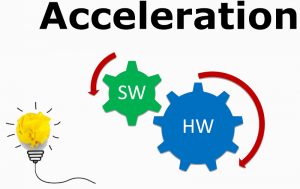In the era of the Internet-of-Things (IoT), hardware acceleration has emerged as a pivotal technology, fundamentally enhancing the performance and efficiency of IoT devices. As IoT devices become ubiquitous, spanning from smart home appliances to sophisticated industrial machinery, the demands for faster data processing, real-time analytics, and enhanced power efficiency have drastically increased. Hardware acceleration addresses these demands by offloading specific computational tasks from the main processor to specialized hardware circuits, thus optimizing the overall system performance.
ACCELERATE, SPECIALIZE AND AUTOMATE
The only way to continue performance scaling in the short to medium term is to specialize hardware for important application domains, such as artificial intelligence and processing near memory. This will only be economically viable if it is automated.

Enhancing Performance and Efficiency
Hardware acceleration allows IoT devices to perform complex computations more efficiently than general-purpose processors. This is particularly critical in applications requiring real-time processing and decision-making, such as in autonomous vehicles or real-time health monitoring systems. By using specialized hardware like GPUs, FPGAs, or ASICs, IoT devices can achieve higher throughput and faster processing times, enabling them to handle larger datasets and execute more complex algorithms swiftly.
Energy Conservation
IoT devices often operate in power-constrained environments, making energy efficiency a top priority. Hardware accelerators can execute tasks more efficiently than CPUs, consuming less power for the same tasks. This is crucial for battery-operated devices like wearable technology and remote sensors, where prolonged operational life is essential. For instance, an IoT device using an FPGA for image processing tasks can use less power than using a conventional CPU, extending battery life significantly.
Enabling Edge Computing
The shift towards edge computing in the IoT landscape further underscores the importance of hardware acceleration. By processing data locally on the device, rather than relying on cloud servers, edge devices can reduce latency, save bandwidth, and function reliably even with intermittent connectivity. Moreover, they preserve data privacy and security aspects, as data is processed in local manner. Hardware accelerators play a crucial role in this decentralized approach, as they provide the necessary computational power to handle analytics and machine learning tasks directly on the devices.
Future Proofing IoT Solutions
As IoT technologies continue to evolve, the complexity and volume of data generated by these devices will only grow. Hardware acceleration not only offers the necessary capabilities to manage current demands but also scales effectively to meet future needs. Implementing hardware accelerators can thus be seen as an investment in future-proofing IoT solutions, ensuring they remain capable and efficient as new technologies and standards emerge.
DEVELOP ALTERNATIVE ARCHITECTURES
Architectures need to be revisited considering the end of exponential scaling in computing power, and to improve energy and efficiency. Alternatives to von Neumann should be investigated to meet needs such as processing huge amounts of data.
Our laboratory boasts a rich history of designing advanced hardware accelerators tailored for a diverse array of application domains, such as 5G, rover navigation, and signal processing. Following the design and customization phases, these accelerators are deployed on cutting-edge FPGA boards from leading providers like Altera and Xilinx. Beyond using commercially available platforms, our physical implementations benefit significantly from a suite of proprietary software tools developed in-house. These tools enhance performance through techniques like approximate computing (AutoMap Framework) and expedite the time-to-market (Plug&Chip Framework), which facilitate customization and rapid prototyping tasks for hardware/software co-design.
For additional information regarding the available technologies, software tools and IP kernels please contact Dr. Kostas Siozios.